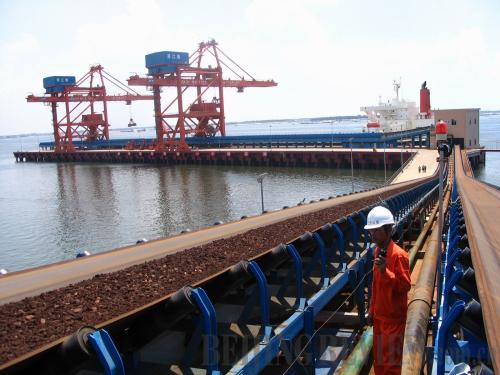|
Pressure on the mills
 |
|
SELF-SUFFICIENT: Iron ore is transferred at the 200,000-ton ore dock at Zhanjiang Port in south China's Guangdong Province (JIAN CHENMING) |
"Large-scale price hikes will cause Chinese steelmakers to start incurring huge losses," said Jia Yinsong, an inspector with the raw material department of MII.
Even Baosteel, one of China's five major steelmakers which has handled cost control in the past, is feeling the pressure of a possible 90-percent increase, which could add $80 for every ton of iron produced. The increase will be even more detrimental to small and medium-sized steel mills with smaller financial resource pools.
Affected by the financial crisis, China's iron and steel industry ran at a loss from October 2008 to April 2009, and only began reaping profits again in May last year. The profit rate of Chinese steelmakers last year was only 2.46 percent, far less than the average 5.47 percent of the country's industrial sector, while BHP Billiton raked in $6.1 billion in net profits in the second half of 2009, up 134.4 percent.
China's steelmakers began to transfer that pressure by increasing the prices of their products. According to statistics from Xiben New Line Co. Ltd., a steel product trading platform, more than 20 steel mills announced price hikes for their products on March 25.
The real estate industry bears the brunt of steel price increases—steel accounts for 15 percent of the cost of all construction materials.
Price increases for household appliances such as refrigerators, washing machines and air conditioners are inevitable too, as manufacturers already make razor-thin profits.
Price increases of manufactured goods will only aggravate inflationary pressures in China.
Want it self-sufficient
CISA said China would increase its domestic supply of iron ore if Chinese steelmakers continue to lose ground at the iron ore benchmark negotiation.
CISA statistics said iron ore production increased 17.8 percent year on year in the January-February period this year, almost doubling the growth rate from the previous year. Annual production will increase to 1 billion tons, from last year's 880 million tons.
In addition, iron ore projects under construction or planning have an annual production capacity of 480 million tons, and mining at these projects will start in two or three years.
And China has enough reserves to sustain itself, should it need to. The country has made breakthroughs in mineral exploration in recent years, reporting verified iron ore reserves of nearly 12 billion tons. A report on the mineral exploration work in 2009, compiled by the China Geological Survey under the Ministry of Land and Resources and released on April 2, predicted China could have more than 200 billion tons of iron ore reserves.
CISA said the high cost of iron ore mining in China accounts for the insufficient domestic supply, because China has many small and medium-sized mines but few large ones. In addition, a considerable amount of these reserves consist of associated ore, which makes mining and processing more difficult. Yet, MII and major steelmakers have invested heavily in iron ore mining and processing technologies in recent years, and these efforts are expected to greatly increase China's iron ore production in the future.
| 